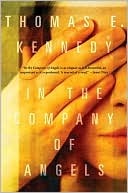Mister Pip & The Company of Angels
I haven’t posted any book reviews recently, so I thought today I’d share with you a couple of books I read recently and particularly liked:

MISTER PIP by Lloyd Jones: I adored this book. Devoured it. Jones understands character like few other writers. MISTER PIP is narrated by Matilda, a young girl living on a copper-rich tropical island, torn apart by war. All the whites have fled, save for Mr. Watts, an odd old duck in a filthy linen suit who sometimes sports a red clown’s nose. He is married to a mad local woman whom his pulls about in a wagon. With the sound of artillery in the distance, Mr. Watts cleans out the ruined schoolhouse and begins reading Dickens’ classic GREAT EXPECTATIONS to his students (Matilda among them). Drunken militias lurk in the forests wielding machetes, fire and horror, and yet Mr. Watts continues reading, continues building a wall of words against the impending terrors.
A war story, a coming of age story, a love story — this is, above all, a novel ABOUT books, and the power of books to expand understanding, develop morality and transform lives. It is also a brilliant (and I don’t use that word lightly) character piece about a man whose “survival weapon was story.” MISTER PIP was shortlisted for the Man Book Prize, and won the commonwealth Writer’s Prize. It deserves all the accolades its received. Highly recommended.
The second book I’m recommending is IN THE COMPANY OF ANGELS by Thomas E. Kennedy. I must say up front that I’ve known Tom Kennedy for a long time, and I’m extremely fond of him. Thus, I’d probably give this book five stars even if I really thought it only deserved four. However, in this case, I want you to know I think it deserves the full five.
Kennedy has lived in Copenhagen for decades, and IN THE COMPANY OF ANGELS is a volume in his COPENHAGEN QUARTET. It was first published by a tiny (but terrific) Irish publisher and recently picked up by Bloomsbury. Kennedy has published more than twenty books in his career, and this is the first to be picked up by a big house. Which only tells you the big houses have missed the boat for decades. Hopefully Kennedy will now get the readership he deserves.
Kennedy has worked as an editor and translator in one of Copenhagen’s centers for the rehabilitation of torture victims. Clearly, what he learned about the human soul while working there, both good and bad, has haunted him. He mined his experiences there and created the central character, Nardo Greene, a Chilean tortured for years by Pinochet’s thugs, who is in Copenhagen for treatment at one of the aforementioned rehabilitation centers.
While being tortured Nardo had a vision/experience, which I will let you discover for yourself, but which involves the angels in the title. The torture is horrific, and inventive. I will not describe it here (I couldn’t bear to), and although Nardo has survived, he has paid a terrible price. Thorkild Kirstensen, the doctor treating him, is able to help him overcome some of the physical traumas, but the psychological damage is far more intransigent. Then, Nardo catches sight of a woman, Michela, a woman with her own torments, and through his involvement with her, the glimmer and possibility of life begins to return.
There are other characters, such as Michela’s violent lover, Voss, and her parents, languishing in a state-run hospice, who are equally well-developed and whose voices are pitch-perfect, but it was the slow tango between Nardo and Michela that kept me riveted.
Kennedy is a prose master, and his love for poetry is shared and reflected by his characters, who quote Lorca, Neruda, Joyce and Matthew Arnold, among others, and who use the language of poetry to make sense of a word at times too horrible for words. It’s a joy to read.
Two moments near the end of the book stood out for me (although there were many such moment throughout the novel). In one, Michela talks about her daughter, who died, probably at her own hand, years before. “We did not manage to give you the hope and joy necessary to survival,” she thinks. In the other, one of the characters, during a particularly painful moment of soul-searching, comes upon a park sculpture he’s seen many times before, but never really noticed. Now, like the Joycean characters Kennedy channels, he has an epiphany — these elms were devastated by blight years before, but the city officials, rather than merely chopping down the poor crippled remains, commissioned local artists to transform them into things of beauty, although even in the midst of that beauty, the shadow of what they endured remains.
Kennedy examines violence and loss in this complex story. The subject matter may be dark, but his compassion and grace transform the work into something angel-lit.
Happy Reading!

